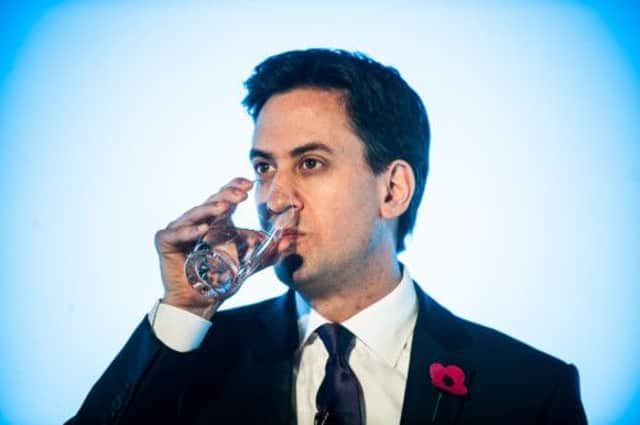Gregor Gall: Ed Miliband is so far from red


How red is Ed? Judging by the fulminations of his enemies in the media, Ed Miliband’s recent policy announcements in the run-up to the 2015 general election are an unwelcome and worrying departure. While one newspaper could not quite make Ed out to be as left wing as his father, Marxist academic Ralph Miliband, it has raised the spectre of a return to a socialist past.
Unfortunately for the newspaper in question, its loathing of anything remotely progressive has blinded it to the reality that Ed is a lot less red than he is made out to be – and that is no good thing.
Advertisement
Hide AdAdvertisement
Hide AdMiliband’s turn to radicalism began just before this year’s Labour conference, where he signalled that an incoming Labour government would enforce a stricter enforcement of the minimum wage, compel employers to only take on a skilled worker from outside the EU if they train a British worker, regulate the worst of zero hour contracts, and build 200,000 new affordable homes by 2020.
He then took this a stage further with his planned price freeze on energy companies for 20 months and tax breaks for companies paying the “living wage”. Put together, these initiatives are about fleshing out Miliband’s big idea of “one nation” and, specifically, to support what he calls the “squeezed middle”.
There is no doubt that these measures are to be welcomed and that they represent the opening up of a policy gap between Labour and the Tories. But they are hardly “clear red water” and certainly do not represent the rejection of the neo-liberal dogma of “new” Labour, as Unite’s Len McCluskey claimed.
Miliband claims to be a democratic socialist as well as a social democrat. But neither stands up to serious examination. The fundamental character of either democratic socialism or social democracy (which are interchangeable terms) is that a political party is prepared in government to use the state to intervene in the processes of the market in order to ameliorate the outcomes of the market.
Under such intervention, social inequality and wealth disparity are reduced but capitalism still operates, as neither the market nor private property have been abolished (as would be the case under socialism per se).
Judged against this benchmark, Miliband has such a long way to go that it’s more accurate to see him as merely tinkering around the edges. State intervention in the labour, capital and product markets would see a regulation of employers’ ability to treat workers, citizens and consumers as inferiors and subordinates.
In the labour market, it would mean ending the legal shackles on unions’ ability to represent their members and overturning the unilateral right of employers to hire and fire. In capital markets, the casino economy would be so restricted that the financiers would no longer be capable of making or breaking a country. And in the product markets, it would mean price controls on the basics of like food and rent as well as nationalisation of key sectors of the economy like transport, communication and utilities.
(Re)nationalisation would mean the return of Royal Mail, the railways, gas, water, electricity and so on to the state so that no longer can profiteers make a killing out of them.
Advertisement
Hide AdAdvertisement
Hide AdBut state spending would also be higher as a result of a system of progressive taxation where the rich do pay much more (and evasion and avoidance are clamped down upon). Low paying employers would not be effectively subsidised by the benefits system and a group such as the working poor would not exist.
More than ever at the moment, it would mean that Labour would not abide by the austerity programme of the current coalition government. So public sector pay freezes would not continue and neither would cuts in expenditure. The only occasions Labour promises to spend more are as a result of making cuts elsewhere.
Miliband still believes that the market can be made to work for people, the very hallmark of “new” Labour. Indeed, he proclaims that he stands for “responsible capitalism”. But he is unwilling to take the very steps that could make capitalism responsible because he will not countenance using the state for that purpose.
This is why his support for the idea of pre-distribution, floated at the 2012 Labour conference, has not been returned to. Pre-distribution is the idea that the state should try to prevent inequalities occurring in the first place, rather than ameliorating inequalities through the tax and benefits system once they have occurred as happens under various acts of redistribution. In other words, pre-distribution is way too radical for Miliband because it is actually about democratic socialism and social democracy.
Even when Miliband toyed with pre-distribution, he took it to mean making sure that education was better for all so that no one was forced to end up in dead end, low-paid jobs. That is decidedly not tackling the market but, rather, an endorsement of meritocracy.
Nonetheless, an opportunity has opened up for the radical left because of Miliband’s policy pronouncements. This is because they open up the space for alternatives to emerge.
On the utilities, the mere mention of a temporary price freeze provides legitimacy to the view that price controls should be permanent and that the best way to do this is to have the utilities back in the public sector. Similarly, building new affordable homes allows the argument to emerge that local authorities should be allowed to return to their housebuilding projects of old.
• Gregor Gall is professor of industrial relations at the University of Bradford